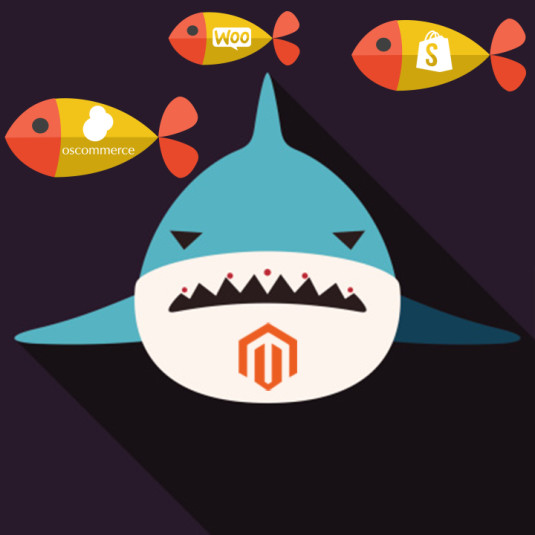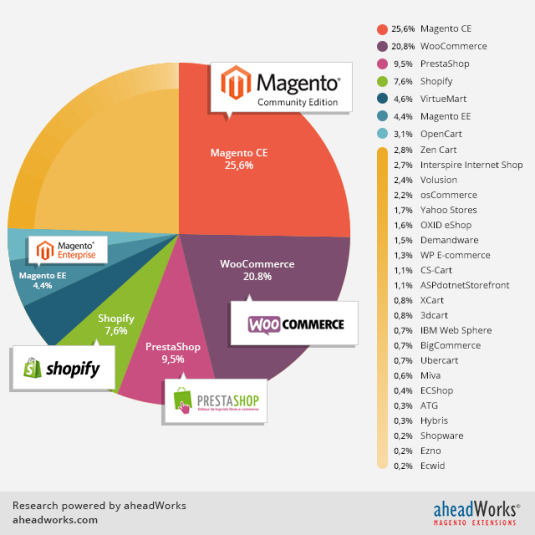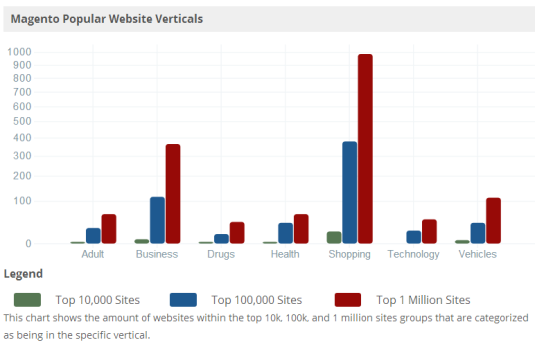It’s an ocean out there. The big fish eats the smaller. And the smaller eats the weaker. With a surge in E-commerce transactions, the modern-day Ecommerce Cart is evolving at a mind-boggling pace.

Magento Shopping Cart Good?
It’s an absolute necessity for most online store owners to ensure that their cart software is both – intuitive and robust.With almost 60% internet literate users, starting their “buy” related searches online; Search Engine Optimization is another factor that most e-commerce store owners need to factor in while considering the best cart software for their online shop.
Due to the popularity of this topic, we decided to do this blogpost that dissects Magento as a modern day Shopping Cart of choice. WORDPRESS is the most popular Content Management System (CMS) with 20% of the all websites built on it, whereas Magento has the distinction of being the MOST popular CMS for e-commerce.
What is Magento?
Magento is an e-commerce platform developed by Varien Inc. It is built on open-source technology using Zend PhP and MySQL that provides online merchants with complete control over the content, look and functionality of their e-commerce store. Moreover it also provides catalog management, search engine optimization and marketing tools.
Till date, Magento – has had 22 version, with the latest one being ver 1.9.1.0, available to download. Magento provides three different versions – Magento Community Edition, Magento Enterprise Edition and Magento Go.
Magento Community Edition
Magento Community Edition is an open-source content-management system whose latest version 1.9.1.0 was released on Nov. 24, 2014. Developers can implement and modify the core files, as well as extend their functionality by adding new plug-ins provided by other developers. This edition has been developed and customized since 2007 to provide a basic e-commerce platform.
Magento Enterprise Edition
With the latest version 1.14.0.1, Magento Enterprise Edition adds a lot of features and functionality to the Community Edition. It is derived from the Community Edition and has the same core files. But unlike the Community Edition, the Enterprise is not available free of cost. It proves highly useful for large businesses that require technical support at various stages such as installation, usage configuring and troubleshooting.
Magento Go Edition
Unlike the previous editions, Magento Go is a cloud based platform and also includes the additional feature of web hosting. Launched in 2011, Go is of significant value for small businesses as there is no need for a software installation. But this feature also severely limits its customizability.
What Makes Magento Better?
Magento dominates the e-commerce market with around 26% share; such large scale adoption and popularity are because of the following reasons:
a) Magento Is Open Source
Magento is an open source platform. Developers can modify the source code, add features and functionalities by creating or installing add-ons and plug-ins as per their requirement. Thousands of developers from around the globe are working together to make it bigger, better and even more customizable.
b) Built for E-commerce
WordPress, although considered a full-blown CMS today, isn’t built specifically for e-commerce like Magento. That’s precisely why Magento scores over ‘Wordpress + WooCommerce’ and ‘Drupal + Drupal Commerce’ combos. It comes preloaded with scores of features and specs needed to put up a functional e-commerce website
c) Magento Is Highly Scalable
Magento can be molded into any shape and size .It can adapt to a small business requirement and also to a complicated and large-scale requirement. Magento can be customized to serve a business model of any reach and size. Brand Owners can expand the platform as per their requirement provided that they work with a Magento expert team.
d) Magento Is SEO Friendly
If your website does not get traffic visits through search engines then you are not going to achieve a return on your investment. Search engines love Magento because it creates very clean URLs, tags and descriptions with keywords which directly increases sales and revenue generation. It also features powerful tools that can prove helpful in optimizing your business.
Understanding Magento Framework
In a typical PHP Model-View-Controller (MVC) application, files are grouped together based on their functionality and how they interact with each other. To understand the MVC, one needs to understand the three different components of the model directly manages the data, logic and rules of the application and notifies the controller of any update of the information on the page. A view can be any output representation of the information, such as a chart or a graph. View represents all the changes that occur after the model has computed the data. The third part, the controller, accepts input and converts it to commands for the other two components – the model and the view, according to the type of requests.
To better understand this, let us take an example of a hotel system. In this system, the Receptionist will be the controller. The Cook will be the model and the Busboy will be the view. While you’re in the room, you’ll only ever physically interact with the Busboy. The Busboy presents the output for you. The Receptionist is the one who controls both the Cook (model) and The Busboy (view). When you place an order for dinner, the Receptionist (controller) notes your order (accepts input) and notifies both the cook and the waiter (commands both the model and the view) of your request. The Cook (model) prepares your meal (updates the information) and finally the Busboy delivers your food (the output). Below is a flowchart for the whole process to give you a visual representation of the whole process.

Why Do Developers Prefer Magento?
Magento is suitable for e-commerce companies serving just one town or a state as well as companies as far-reaching as MNCs. It grows with your business; regardless of the kind of e-commerce features or enhancements you need, Magento will never fail to surprise you. No other e-commerce system except Magento offers with the same depth of rich features and powerful inbuilt functionalities. The flexible, scalable and robust architecture of Magento makes it a favorite of developers when it comes to e-commerce development. Developers love Magento for the following reasons:
– Operating System Portability. The robustness and the flexibility features of Magento enables the applications to run on different Operating Systems.
– Analysis. Magento allows developers to integrate Google Analytics with the application that enables them to track parameters like customer activity, product performance etc.
– Multilingual. It supports the usage of different languages which widens its reach and acceptance across the globe.
– Personalization. It enables users to personalize their usage on the application and enable them to perform activities such as making a wish list, tracking orders etc.
How Popular Is Magento?
Due to a long list of customizability and scalability features, Magento has quickly proved to be the fastest emerging e-commerce solutions. Our good friends at AheadWorks did an analysis of 1 million top websites and Magento emerged as a clear leader across the globe.

In another study that focused on the market verticals that make use of the Magento framework, it clearly appeared as the most desirable platform for e-commerce (especially shopping websites.

Magento’s popularity has been steadily rising since it’s realease in 2008. The below graph by Google Trends shows how well Magento has been received over the years.
How Magento Keeps Up?
Magento is always evolving. Since its first wide release in 2008, there have been 22 different versions of Magento with hundreds of improvements and upgrades to its already overflowing feature list. Magento keeps up with time by regularly calling traders, retailers and developers from around the globe for their two-day conferences where insights are shared, ideas are exchanged and Magento is made better. The last such event, MagentoLive was held in London, UK. It featured several technology, marketing and business sessions from prominent spokespersons offering their analysis and insights on Magento and its future.
Why Should You Choose Magento?
Choosing Magento as your e-commerce platform means that you can easily transform your online shopping website with the much required edge in creating a dynamic interface that not only attracts and sells; but also provides an amazing experience for visitors. Along with the wide range of features discussed above, what puts Magento ahead of its competitors is its distinguishable quality of providing the best experience and satisfaction to all its users. So if you are a small-time trader looking for expanding your business online, or a big online brand looking to add functionalities to your existing business, Magento might just be the solution to all your e-commerce woes.

